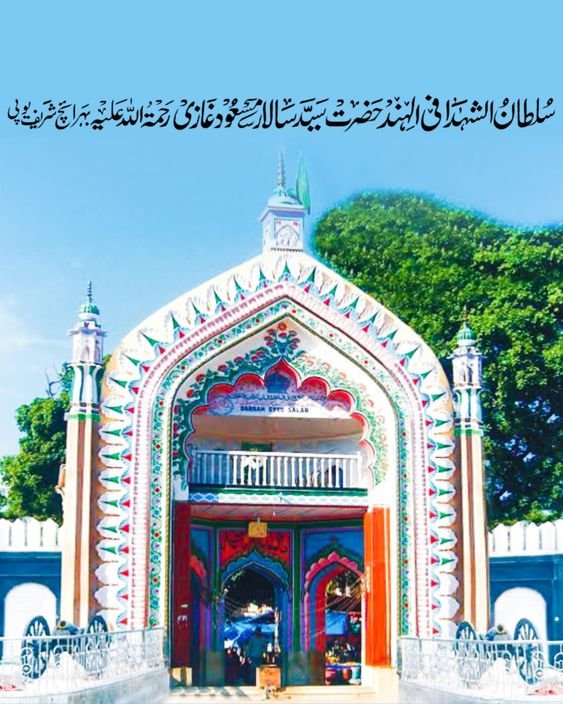*** Hazrat Sayyad Masood Ghazi (R.A.) ***
Sayyad Masood Ghazi, also known as Hazrat Sayyad Masood Ghazi , is a revered Sufi saint and warrior whose legacy has significantly influenced the spiritual and cultural landscape Bahraich of Northern India. His life is characterized by a deep commitment to Sufism, a dedication to spreading Islamic teachings, and a reputation as a spiritual guide and protector. His title, "Ghazi", which means "warrior", indicates his role in both the spiritual and physical defense of the faith. Below are detailed notes about his life, teachings, and legacy.
Early Life and Background:
Lineage and Ancestry:
Sayyad Masood Ghazi hailed from a noble lineage, with his ancestry tracing back to the Ahl al-Bayt, or the family of the Prophet Muhammad (peace be upon him),. This connection made him a Sayyid, a respected title in the Islamic World. Born into a family with a strong emphasis on spirituality and knowledge, he received early religious education, which laid the foundation for his later role as a Sufi saint and leader.Migration to India:
Like many Sufi saints, Sayyad Masood Ghazi migrated to India as part of a larger movement of Islamic scholars and spiritual leaders seeking to spread the teachings of Islam and Sufism to new regions. His journey to India was both a spiritual mission and an effort to support the growing Muslim community in the region, blending his spiritual pursuits with a sense of duty towards the Islamic faith. Role as a "Ghazi" and Defender of the Faith:Meaning of "Ghazi":
The title "Ghazi" means "victorious warrior" or "one who fights in the cause of Islam." It reflects Sayyad Masood Ghazi's role in defending Muslim communities and promoting Islamic teachings through both peaceful means and military support. He is remembered for his courage and willingness to confront challenges to the Islamic faith, whether they were spiritual or physical.
Military and Spiritual Efforts:
Sayyad Masood Ghazi's life combined the roles of a spiritual guide and a leader who took up
arms when necessary to protect the community. This dual role helped establish his reputation as a defender
of the faith.
He was involved in efforts to maintain the safety of the Muslim population, offering both spiritual guidance
and active leadership during times of conflict.
Spiritual Teachings and Sufi Practices:
Sufi Orientation:
Deeply rooted in Sufi traditions, Sayyad Masood Ghazi's teachings emphasized the importance of
inner purification, love for God, and service to humanity. His approach was to guide his followers towards a
closer relationship with God through self-discipline and devotion.
His practices included dhikr (remembrance of God), meditative prayer, and asceticism, focusing on detaching
oneself from material desires to achieve spiritual enlightenment.
Influence on Disciples:
Sayyad Masood Ghazi attracted a large following of disciples who sought his guidance in
understanding Sufi principles. His teachings emphasized the need for balancing the Sharia (Islamic law) with
the Tariqa (spiritual path).
He mentored his followers in the art of spiritual self-awareness and devotion to God, encouraging them to
practice charity, humility, and honesty in their daily lives.
Miracles and Spiritual Powers:
As is common in Sufi tradition, Sayyad Masood Ghazi is believed to have performed various
miracles (Karamat), which further solidified his reputation as a saint. These stories of miraculous events
often serve to highlight his spiritual rank and the divine favor he was thought to possess.
Such miracles are recounted by his followers and visitors to his shrine, forming an integral part of his
legacy and the stories passed down through generations.
Legacy and Dargah (Shrine):
The Dargah as a Spiritual Center:
The dargah (shrine) of Sayyad Masood Ghazi has become a major site of pilgrimage, drawing visitors from various regions who come to seek blessings and pay their respects. Bahraich located in a region of North India with historical significance, his shrine is known for being a place where spiritual seekers gather, especially during his Urs (anniversary of his death).Urs Celebration:
The annual Urs of Sayyad Masood Ghazi is a significant event marked by prayers, recitations, and Qawwali (Sufi devotional music). It serves as a reminder of his spiritual legacy and a time for devotees to reflect on his teachings. During the Urs, followers participate in charity, feeding the poor, and organizing gatherings that celebrate his life and contributions.Community Impact:
Sayyad Masood Ghazi's impact extended beyond the spiritual; he played a role in community development and social welfare, establishing traditions of hospitality and care for the needy that continue in the practices around his shrine. His emphasis on interfaith harmony and compassion for all left a lasting mark on the cultural fabric of the area, influencing both Muslims and non-Muslims.Contribution to Islamic Thought:
Balancing Sharia and Sufism:
Sayyad Masood Ghazi is remembered for his ability to integrate the Sharia (legal aspects of Islam) with the mystical practices of Sufism. This balanced approach made his teachings accessible to a broader audience. His insistence on following Islamic law while pursuing the mystical aspects of faith made him a respected figure among both orthodox Islamic scholars and mystics.Influence on Later Sufis:
The spiritual legacy of Sayyad Masood Ghazi influenced later generations of Sufi saints and Islamic scholars in the region. His life serves as a model for those seeking to understand the Sufi path while maintaining a strong foundation in Islamic Principles. His teachings continue to be studied by those who seek a deeper understanding of Sufism and Islamic spirituality, offering insights into the pursuit of a God-centered life.Conclusion:
Sayyad Masood Ghazi's life represents a unique blend of spiritual wisdom, militant leadership, and community service. His title as a "Ghazi" highlights his role in protecting and spreading Islam, while his contributions to Sufism emphasize the importance of inner spiritual transformation. His dargah serves as a center of spiritual inspiration, where followers continue to gather to honor his memory, seek guidance, and celebrate his legacy. Through his life and teachings, Sayyad Masood Ghazi remains a symbol of devotion, bravery, and unwavering commitment to both God and the community.


